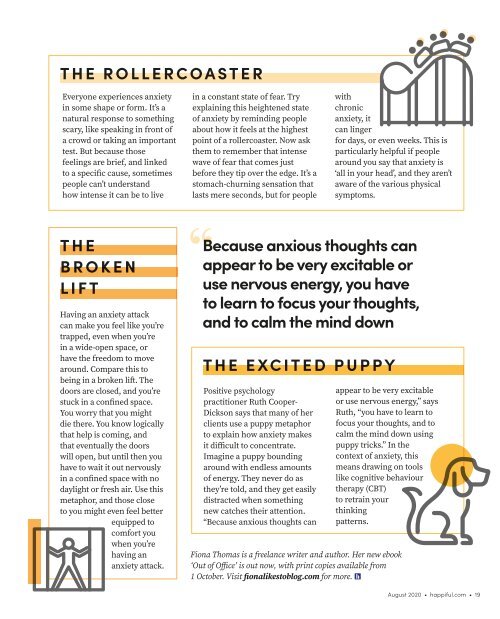Happiful August 2020
You also want an ePaper? Increase the reach of your titles
YUMPU automatically turns print PDFs into web optimized ePapers that Google loves.
THE ROLLERCOASTER<br />
Everyone experiences anxiety<br />
in some shape or form. It’s a<br />
natural response to something<br />
scary, like speaking in front of<br />
a crowd or taking an important<br />
test. But because those<br />
feelings are brief, and linked<br />
to a specific cause, sometimes<br />
people can’t understand<br />
how intense it can be to live<br />
in a constant state of fear. Try<br />
explaining this heightened state<br />
of anxiety by reminding people<br />
about how it feels at the highest<br />
point of a rollercoaster. Now ask<br />
them to remember that intense<br />
wave of fear that comes just<br />
before they tip over the edge. It’s a<br />
stomach-churning sensation that<br />
lasts mere seconds, but for people<br />
with<br />
chronic<br />
anxiety, it<br />
can linger<br />
for days, or even weeks. This is<br />
particularly helpful if people<br />
around you say that anxiety is<br />
‘all in your head’, and they aren’t<br />
aware of the various physical<br />
symptoms.<br />
THE<br />
BROKEN<br />
LIFT<br />
Having an anxiety attack<br />
can make you feel like you’re<br />
trapped, even when you’re<br />
in a wide-open space, or<br />
have the freedom to move<br />
around. Compare this to<br />
being in a broken lift. The<br />
doors are closed, and you’re<br />
stuck in a confined space.<br />
You worry that you might<br />
die there. You know logically<br />
that help is coming, and<br />
that eventually the doors<br />
will open, but until then you<br />
have to wait it out nervously<br />
in a confined space with no<br />
daylight or fresh air. Use this<br />
metaphor, and those close<br />
to you might even feel better<br />
equipped to<br />
comfort you<br />
when you’re<br />
having an<br />
anxiety attack.<br />
Because anxious thoughts can<br />
appear to be very excitable or<br />
use nervous energy, you have<br />
to learn to focus your thoughts,<br />
and to calm the mind down<br />
THE EXCITED PUPPY<br />
Positive psychology<br />
practitioner Ruth Cooper-<br />
Dickson says that many of her<br />
clients use a puppy metaphor<br />
to explain how anxiety makes<br />
it difficult to concentrate.<br />
Imagine a puppy bounding<br />
around with endless amounts<br />
of energy. They never do as<br />
they’re told, and they get easily<br />
distracted when something<br />
new catches their attention.<br />
“Because anxious thoughts can<br />
appear to be very excitable<br />
or use nervous energy,” says<br />
Ruth, “you have to learn to<br />
focus your thoughts, and to<br />
calm the mind down using<br />
puppy tricks.” In the<br />
context of anxiety, this<br />
means drawing on tools<br />
like cognitive behaviour<br />
therapy (CBT)<br />
to retrain your<br />
thinking<br />
patterns.<br />
Fiona Thomas is a freelance writer and author. Her new ebook<br />
‘Out of Office’ is out now, with print copies available from<br />
1 October. Visit fionalikestoblog.com for more.<br />
<strong>August</strong> <strong>2020</strong> • happiful.com • 19

















